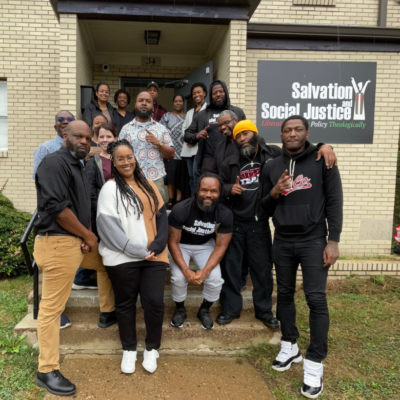Pay for Success: New Capital for Evidence-Based Programming
Hosted by the National Reentry Resource Center and The Urban Institute
• To download a PDF of the presentation, click here.
This webinar examines the benefits and challenges of publicly funded “pay for success” (PFS) programs, which tie dollars directly to results. It also includes information about the Social Innovation Fund (SIF), a White House initiative that seeks to combine public and private resources to develop community-based solutions; about a new SIF PFS federal grant program; and about project opportunities…
Hosted by the National Reentry Resource Center and The Urban Institute
• To download a PDF of the presentation, click here.
This webinar examines the benefits and challenges of publicly funded “pay for success” (PFS) programs, which tie dollars directly to results. It also includes information about the Social Innovation Fund (SIF), a White House initiative that seeks to combine public and private resources to develop community-based solutions; about a new SIF PFS federal grant program; and about project opportunities from two SIF PFS grantees.
The PFS model comprises four entities—a government agency, a private funder, a public or nonprofit service provider, and an intermediary organization—that work together to develop and implement a social program. The private funder initially pays for the program, which is run by a service provider, and the funder receives a rebate from the government only if the program is determined by an independent evaluation to be successful. (The intermediary organization manages all transactions between funder, government, and service provider and also provides other process-related assistance. The aforementioned SIF PFS grantees, for example, are intermediaries.)
During the webinar, the Urban Institute’s Dr. John K. Roman notes that the PFS structure is new and, as such, isn’t always so categorically defined: “It is evolving, and it will keep evolving,” he says. He also discusses PFS’s advantages and disadvantages. For instance, PFS transfers initial risk from the government to private funders, which saves public money. But because only the programs that show evidence of success will continue to receive funding, Roman says, PFS can also potentially limit the ability of nonprofits to try new approaches that haven’t yet demonstrated positive results.
After Roman’s presentation, Jennifer Stoff, a senior program officer at SIF, summarizes SIF’s PFS grant program, which was created in 2014 to test the feasibility of different PFS approaches and enlarge the number of organizations undertaking PFS projects. Grantees are intermediaries that will implement projects either by providing technical assistance to jurisdictions and/or organizations, both to assess the feasibility of and develop capacity for PFS projects; or by helping create the structures necessary for a PFS model to work.
The first cohort of SIF PFS intermediary grantees include:
- Corporation for Supportive Housing
- Green and Healthy Homes Initiative
- Harvard Kennedy School Social Impact Bond Lab
- Institute for Child Success, Inc.
- National Council on Crime and Delinquency
- Nonprofit Finance Fund
- Third Sector Capital Partners, Inc.
- University of Utah David Eccles School of Business PFS Lab
The webinar concludes with representatives from two of the above grantees, the National Council on Crime and Delinquency (NCCD) and the Corporation for Supportive Housing (CSH), discussing their PFS projects and opportunities to join those projects. NCCD will provide technical assistance to up to three entities, and it will help them determine the feasibility of using PFS to support programming to reduce racial disparities in child welfare and in juvenile justice systems. CSH will select four to six entities and help them explore the feasibility of a PFS initiative focused on supportive housing and vulnerable populations.
NCCD applications are due January 30 for NCCD. The remaining SIF PFS intermediary grantees will be releasing information about their open competitions through March 2015. To learn more about these opportunities, click here.
Presenter:
- Stephanie Mercier, M.S.W, M.B.A., Senior Program Manager, Corporation for Supportive Housing
- Deirdre O’Connor, LCSW, Senior Program Specialist, National Council on Crime and Delinquency
- John K. Roman, PhD, Senior Fellow, Urban Institute
- Jennifer Stoff, M.A., Senior Program Officer, Social Innovation Fund/Corporation for National and Community Service
Moderator:
- Angela Tolosa, JD, Deputy Program Director, National Reentry Resource Center
Find other events
You might also be interested in
In response to growing calls for police reform in New Jersey, particularly following the shootings of Najee Seabrooks…
Read More Apply Now: Join a Learning Community for Community and Crisis Response Teams to Improve Responses to Youth
Read More
Apply Now: Join a Learning Community for Community and Crisis Response Teams to Improve Responses to Youth
Read More
 Apply Now: Join a Learning Community Focused on Substance Use and Overdose Community Response Programs
Read More
Apply Now: Join a Learning Community Focused on Substance Use and Overdose Community Response Programs
Read More


















